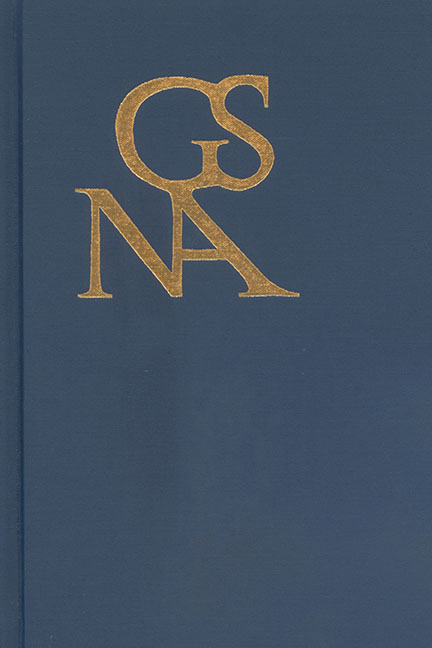Sandro Jung. Kleine Artige Kupfer: Buchillustration Im 18. Jahrhundert. Wolfenbütteler Hefte 36. Wiesbaden: Harrassowitz, 2018. 150 Pp., 92 Illustrations.
Published online by Cambridge University Press: 28 October 2020
Summary
This excellent book accompanied a noteworthy exhibition at Wolfenbüttel's Bibliotheca Augusta in 2018 curated by Sandro Jung, the founding director of the Centre for the Study of Text and Print Culture at Ghent University. Both showcase important eighteenth-century holdings in the Herzog August Library and Sandro Jung's private collection. The publication draws on and expands Jung's eminent studies on the complexities of eighteenth-century print culture and visual cultures in Britain, such as The Publishing and Marketing of Illustrated Literature in Scotland (2017) and James Thomson's “The Seasons,”Print Culture, and Visual Interpretation, 1730–1842 (2015). The book consists of a catalogue of fifty-seven titles with illustrations and a diligently researched and lucidly written introductory article on literary book illustrations in the eighteenth century, its golden age when editions were often decorated with vignettes and full-page copperplates. Jung emphasizes that the illustrations provided not only visual appeal but also important aesthetic information and reflected reading experiences. Readers were to interpret their relation to the text. Each catalogue item is accompanied by an excellent description or concise analysis in clear and precise lan guage, often with quotes from the illustrated text, important technical facts or comments on the edition, publisher, etc.
In his article and in his selection of illustrations, Jung focuses on an aspect previously neglected in the scholarship—namely, transnational contexts and processes of cultural exchange, especially between England and the Germanspeaking countries. He examines illustrations in different editions and in French and German translations of British bestsellers, such as Daniel Defoe's Robinson Crusoe (1719), James Thomson's The Seasons (1730), and James Macpherson's Ossian poems, as well as in “Prunkausgaben,” which are luxuriously produced editions of canonical works such as Milton's Paradise Lost and also of Germanlanguage works that had spread beyond the borders of the country of origin— for example, poetry by Bürger and Gessner. Gessner as both author and illustrator makes a case for the importance of Switzerland in the context of illustrations. The selection also includes illustrated works about nature, comic and religious poetry as well as fables, the Münchhausen adventure stories, and children's readings (Der Kinderfreund).
- Type
- Chapter
- Information
- Goethe Yearbook 27 , pp. 368 - 370Publisher: Boydell & BrewerPrint publication year: 2020



